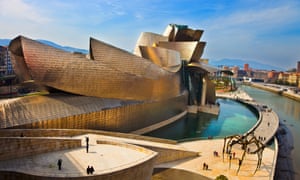 |
| Basque in glory … Bilbao’s Guggenheim Museum. Photograph: Gonzalo Azumendi/Getty Images |
San Sebastián (or Donostia in Basque) is one of the most elegant coastal towns on the Iberian peninsula. It’s also a mecca for foodies, with more Michelin-starred restaurants per capita than anywhere in the world except Kyoto. For a town with fewer than 200,000 inhabitants, it has a lot to offer. Install yourself in Hotel Niza(doubles from €85 room only) and take a walk along the seafront to the Peine del Viento (Comb of the Wind), a sculpture by local artist Eduardo Chillida. There’s an open-air sculpture park dedicated to his work in the nearby town of Hernani.Eat standing up in any of the pintxo bars in the old town – Gandarias (fish main from €14, Kalea 31 de Agosto) is especially good – or take a five-minute trip on the tiny ferry across the mouth of the river from Pasaia to San Juan and dine at Txulotxo(five courses from €35) which does superb fish and seafood with a view out to sea. The San Sebastián area also boasts some of the best surf in Europe, and you can hire everything you need along the seafront or at the resort town of Zarautz about 10km west of the city.
On day three head to Bilbao and Frank Gehry’s spectacular Guggenheim Museum. It’s only an hour by motorway but if you have the time, pick up the coast road about 25km west of San Sebastián and enjoy Basque cuisine at family-run Restaurante Egaña (menu of the day €12) in the port of Lekeitio. Carry on to Bilbao via the lush mountains of the Balcón de Bizkaia. There’s a fine collection of Spanish art in the nearby Museo de Bellas Artes. Check in to the Iturrienea Ostatua Hotel (doubles from €75 room-only). Meat lovers shouldn’t miss a chuletón (T-bone steak) at Asador Ibañez a 10-minute walk away on Calle Ibanez de Bilbao. For something more sophisticated, try Cascanueces, slightly further away at Heros Kalea 21, which, as well as traditional dishes, offers adventurous fare such as a tataki of red tuna or monkfish with wild rice.
Head south and follow the Ebro river from Miranda del Ebro to Haro, the heart of La Rioja. After a night in Los Agustinos (doubles from €72 room-only), a converted 14th-century convent, take the N232 along the Camino de Santiagopilgrim route (although in the wrong direction) and stop at Frank Gehry’s extraordinary remodelling of the Marqués de Riscal winery (tasting €12.00pp). Visit to the winery and tasting of 2 wines)at El Ciego before heading to Logroñowhere, in the early 17th century, the Inquisition interrogated 7,000 suspected witches. Check in to elegant Hotel Marqués de Vallejo (doubles from €70). Dine almost anywhere along Calle Laurel and you won’t go far wrong, but if you like barbecued beef and lamb head straight for Asador El Muro, five minutes’ walk from the hotel.
Stock up on Rioja in Logroño before setting off on day six. Have lunch in the Plaza Mayor in Estella at either Bar Astarriaga or Restaurante La Cepa and then carry on through rolling farmland to Pamplona, capital of the ancient kingdom of Navarre and famous for the running of the bulls in the second week of July. Stay a couple of nights at Hotel Europa (doubles from €87 room-only), which has a one-star Michelin restaurant if you’re feeling flush. Otherwise, pintxos here are just as good as in San Sebastián, especially in Bar Gaucho on Espoz y Mina. Pamplona specialities are smoky piquillo peppers sold in jars or tins and patxaran, a liqueur made from sloes.
Day eight takes you 44km south to Olite, where Charles III of Navarre built his architecturally random palace. After a night in the modest Hotel Merindad de Olite (doubles from €58 room-only), which is built into the Roman wall, leave behind the green of Navarre and head for Zaragoza and the harsher terrain of Aragón. Once a Muslim city-state and one of Spain’s oldest settlements, the city is now a sprawl, but the old town boasts the (Christian-Arab) mudéjar-style Aljafería Palace and the colossal Basilica del Pilar on the banks of the Ebro, which is where you’ll find the Hotel Don Jaime 54 (doubles from €45) just off Plaza del Seo.
On day 10, the road to Teruel runs across a stark landscape to the heart of España profunda, the Spain of heat and dust and castles and endless internecine wars. Its outstanding mudéjar buildings are testament to Teruel’s glorious past but in recent times its citizens have felt so neglected they launched a campaign under the slogan “Teruel exists”. At the time there was only one major road to it, and it is still the only town of any size in Spain without a direct rail link to Madrid. The town has its own bull run in July, called the Vaquilla del Ángel, produces some of Spain’s finest jamón, and is home to Dinopolis, one of the world’s largest dinosaur museums. Romantics should also visit the Mausoleum of the Lovers, a memorial to an unrequited 13th-century love affair. Treat yourself to a couple of nights in the Parador de Teruel (doubles from €90), a mansion built in imitation mudéjar style, which is just out of town and en route to your next destination.
Albarracín stands high on a hill above a meander of the Guadalaviar and is so inaccessible it would have been easy to defend back in medieval times. Even so, in the days when it was an Arab fiefdom, it was enclosed in a crenellated wall. Spend part of day 13 wandering the steep, narrow streets of this extraordinary town perched amid rocky, mountainous terrain.
The journey ends on the shores of the Mediterranean in Valencia, Spain’s third city, and the capital of paella. Visit the aquarium (€22) and Santiago Calatrava’s Ciutat de les Arts i les Ciències .
No two Valencianos will agree on what constitutes the perfect paella but many of them recommend Casa Carmela on the seafront. The restaurant has been serving paella in the traditional way, in a big paellera in the middle of the table, since 1922 and is prized for its paellas’ soccorat, the crunchy crust of rice at the bottom of the pan.
Total distance: 732km
• Iberia flies to San Sebastián from Luton. Ryanair flies to Biarritz and easyJet flies to Biarritz and Bilbao (both about an hour’s drive away) from Gatwick and Stansted. Valencia is served by British Airways, easyJet and Ryanair from London airports. Ryanair also flies from Glasgow to Valencia.
Total distance: 732km
• Iberia flies to San Sebastián from Luton. Ryanair flies to Biarritz and easyJet flies to Biarritz and Bilbao (both about an hour’s drive away) from Gatwick and Stansted. Valencia is served by British Airways, easyJet and Ryanair from London airports. Ryanair also flies from Glasgow to Valencia.
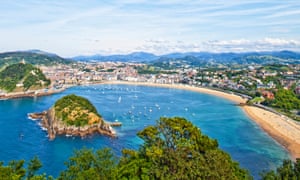
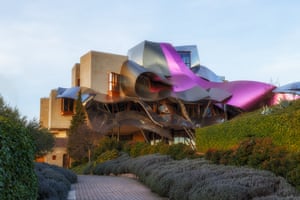
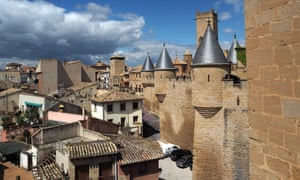
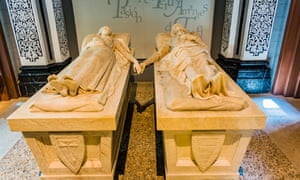
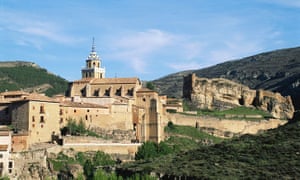
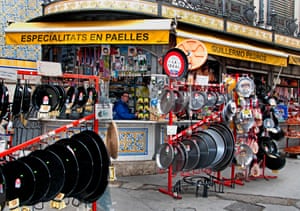
No comments:
Post a Comment